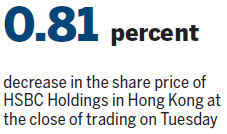|
A fish-eye view inside the HSBC headquarters in Hong Kong. HSBC recently got the nod from mainland authorities to start a credit-card business in the mainland's $1-trillion market. Bobby Yip / Reuters |
HSBC Holdings' winning approval to start a credit-card business in the Chinese mainland's $1-trillion market offers Chief Executive Officer Stuart Gulliver added flexibility in his push into the nation's retail banking and wealth-management industries.
The approval from the mainland authorities came as HSBC ended a card venture with Bank of Communications, the bank's Asia-Pacific head Peter Wong said over the weekend, paving the way for the London-based banking giant to join Citigroup and the Bank of East Asia as the only overseas credit-card issuers on the mainland.
Wong did not say when HSBC won the nod from regulators, or provide any specifics on how the business will be rolled out.
Gulliver's Asian ambitions have been dealt a setback by crashing commodity prices, a slowing China economy and a pretax loss in the fourth quarter. An independent card unit on the mainland would improve HSBC's access to a fast-growing market that had 449 million cards on issue as of September and allow the bank to find new clients for its retail bank.
Getting approved for its own operation on the mainland "is a meaningful step for HSBC as it gives the bank the autonomy to run the business", said Chen Xingyu, a Shanghai-based analyst at Phillip Securities Research.
"Since the Pearl River Delta (PRD) is HSBC's focus, having its own credit-card business can help the bank expand in the region," Chen said.

Credit-card offerings can act as a springboard for drawing customers to other parts of the business, such as private banking, he said. HSBC is getting a license for a planned brokerage venture with Shenzhen Qianhai Financial Holdings.
The PRD, centered around the Guangdong provincial capital Guangzhou, is home to more than 40 million people. HSBC plans to add 4,000 jobs in that area as the bank shifts about $100 billion of investment to Asia in an effort to expand retail banking and wealth management. The bank will slow the pace of that hiring amid the mainland's economic downturn, but HSBC won't alter its strategy, Gulliver said last month.
While the bank has ended its card venture with Bank of Communications, HSBC intends to maintain its roughly 19-percent stake in the mainland lender, Asia-Pacific Chief Executive Officer Wong said on Saturday on the sidelines of the current session of the 12th National People's Congress in Beijing.
HSBC's card offerings would compete with its old venture partner, which had 40 million domestic cards as of June, while Industrial & Commercial Bank of China had 108 million, according to their 2015 interim reports.
HSBC has been working with Bank of Communications - the mainland's fifth-largest lender by assets - since 2004 on businesses, including credit cards. The mainland bank announced the establishment of the credit-card venture - with 2.5 billion yuan ($384.1 million) of capital - in October 2009.
HSBC shares in Hong Kong dropped 0.81 percent on Tuesday to close at HK$49.25, compared with the benchmark Hang Seng Index's 0.8-percent loss. The bank's stock has dropped 20 percent so far this year.
(HK Edition 03/09/2016 page9)
A Frenchman in a coastal Chinese city has combined his zeal for work with passion for life, writes Raymond Zhou.

One of the potentially most traumatic things a girl has to go through is finding a new hairdresser.